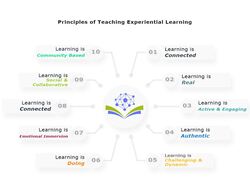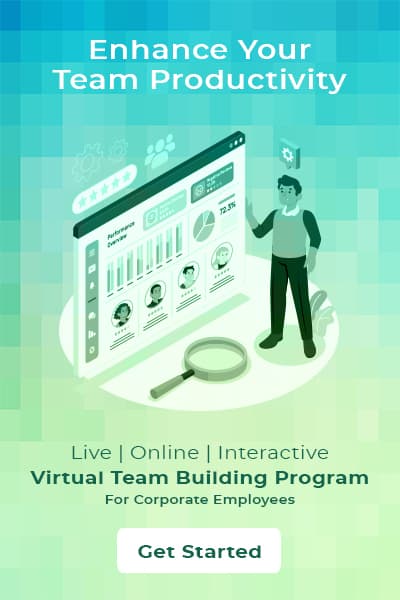Principles of Experiential Learning in School EducationExperiential Learning: The Principles of Practice - Association of Experiential Education - www.aee.org
Principles of Teaching through Experiential Learning in SchoolsLearning is connected.
Learning is an interconnected process. It is not a linear causal process. It is multi-dimensional –there is a learner, the subject, the context, the purpose. While learning learners see connections. They are able to connect the present experiences with their previous knowledge. They make new connections. They look for leverage. Leverage for growth and change lies in connections. Learning is real. Through experiential learning learners work on real life problems in their locality, work and home context. Experiences from the local context of the learner can serve as a source of teaching and learning. It helps the learners understand their society better and make learning real, authentic and exciting for them. Learning is active and engaging. When learners work on real-life issues in the society, it not only helps them understand their society and its challenges better but also empowers them to take responsibility for it. They experience and learn how to make a difference in their society. This is what makes them active citizens. Learning is authentic Learners working in/for the community have authentic purpose and audience for their learning. They work on real issues. They can see how their work will make a difference in the community. They work towards it. It engages them and makes them responsible for their learning and the outcome. Learning is challenging and dynamic Real life is complex. It does not work linearly. It is interconnected and there are loops within loops. It is dynamic. Learners experience true challenge when they work on real-life problems. It engages them at the cognitive, emotional, social and physical levels. Learning is doing Learners work with their hands. They experiment with new ideas. Learners work with expert craftsmen and artisans on real problems and in the process, they experience craftsmanship, self-reliance and conservation. They create with hands and experience possibilities and abundance in their community and self. 
Learning is emotional immersion
Experience is engaging. In the process of learning from experience learners get completely immersed in it. They flow with it. This helps learners in figuring out the world around in a holistic and integrated manner. The understanding developed is much more than just cognitive. It transforms the complete human being. Learning is social and collaborative Learners work together as a teams on real-life issues and they take shared responsibility for the outcome. Working in teams enhances their capacity to learn and create. They learn how to appreciate and leverage diversity. Learning is Community Based. Learners share their learning with community members. This not only validates the usefulness of their knowledge but also helps the community members to understand the teaching and learning process of the school. This engages the community in the school and bridges the gap between school and society. It prepares learners for real life. Learn more on the Experiential Learning Model and Methods |
Contact Us |
- Home
-
Corporate
-
Team Building
>
- Team Building Activities
- Corporate Team Bonding
- Fun Team Outing
- Quotes on Teamwork
- In office Team Building Activities
- 5C Key Elements for Team Building
- Special Team Building >
- Virtual Team Building
- Top 10 Team Building Activities
- Team Building Bangalore
- Team Building Hyderabad
- Team Building Interventions
- Outbound Training >
- Leadership Programs >
- Team Outing >
- Employee Engagement >
- Behavioral Skills >
- Team Development >
- Corporate Adventure >
-
Team Building
>
- Schools
- Individuals
- Clients
- Gallery
- About us
- Articles
- Blog
- Experiential Leadership Training
- Strategic Leadership Training
- Home
-
Corporate
-
Team Building
>
- Team Building Activities
- Corporate Team Bonding
- Fun Team Outing
- Quotes on Teamwork
- In office Team Building Activities
- 5C Key Elements for Team Building
- Special Team Building >
- Virtual Team Building
- Top 10 Team Building Activities
- Team Building Bangalore
- Team Building Hyderabad
- Team Building Interventions
- Outbound Training >
- Leadership Programs >
- Team Outing >
- Employee Engagement >
- Behavioral Skills >
- Team Development >
- Corporate Adventure >
-
Team Building
>
- Schools
- Individuals
- Clients
- Gallery
- About us
- Articles
- Blog
- Experiential Leadership Training
- Strategic Leadership Training
Our Programs
OUR TRAINING DELIVERY LOCATIONS:
Ahmedabad, Bangalore, Chennai, Kolkata, Delhi, Goa, Hyderabad, Mumbai, Pune, Vizag - India
Ahmedabad, Bangalore, Chennai, Kolkata, Delhi, Goa, Hyderabad, Mumbai, Pune, Vizag - India


